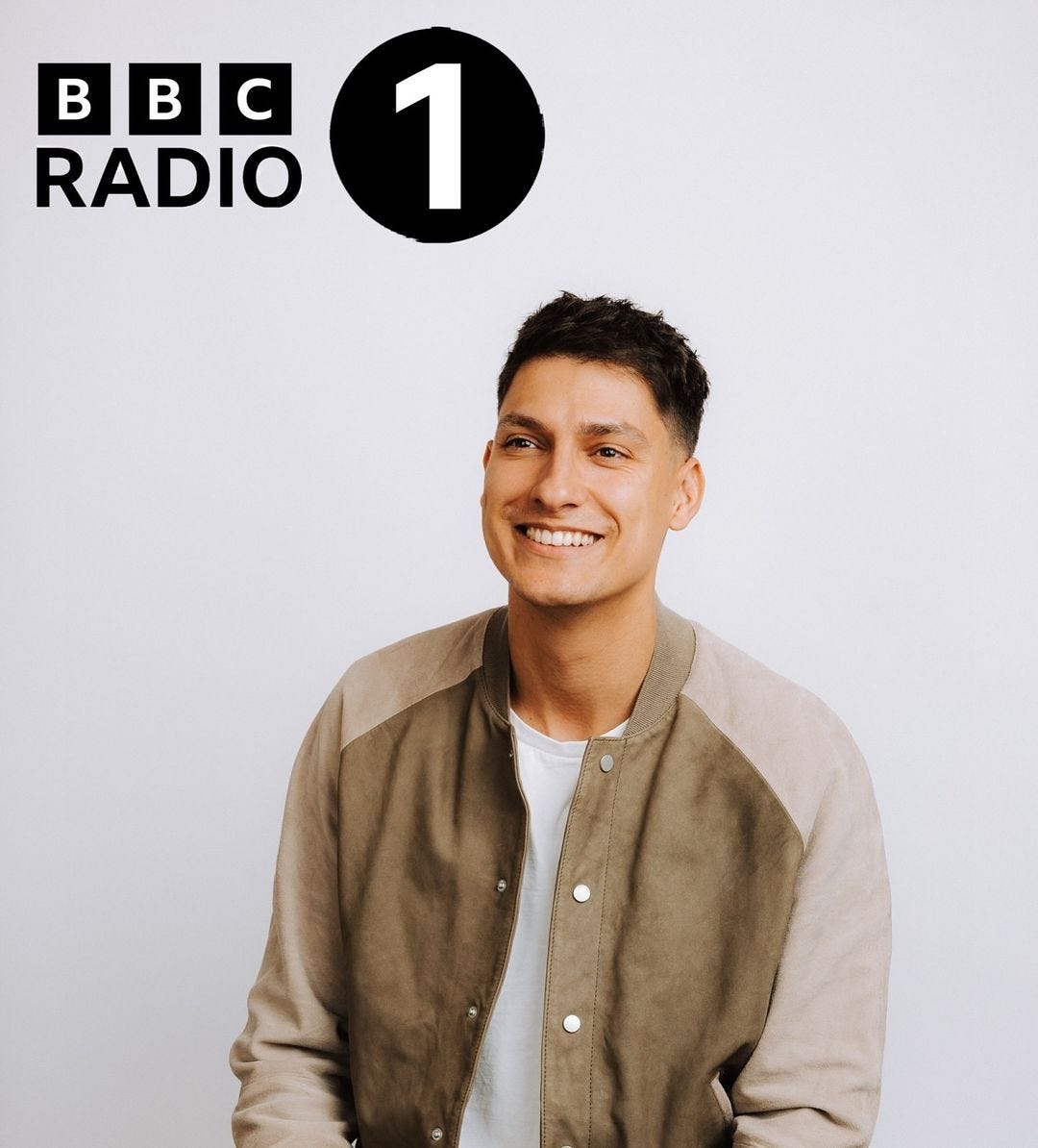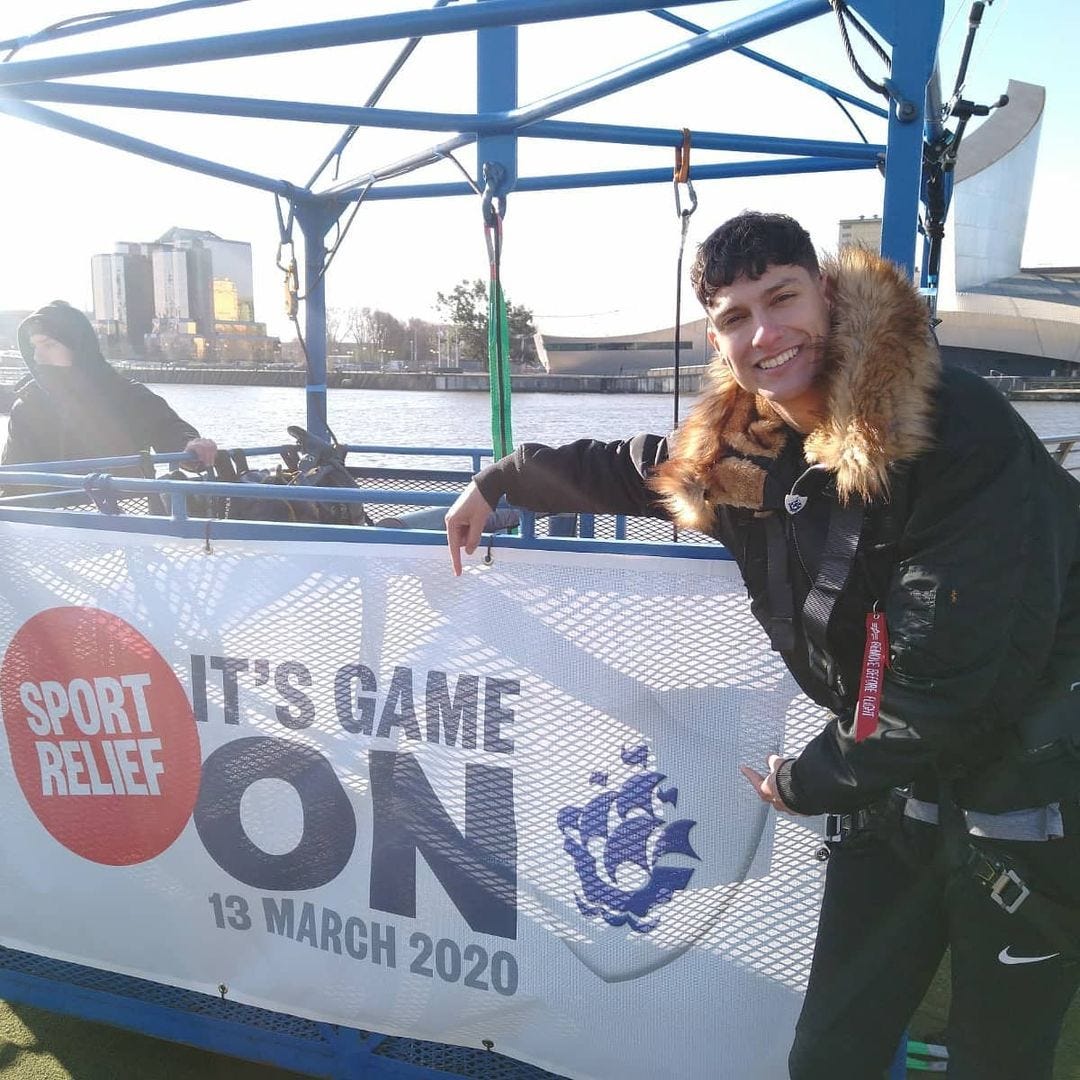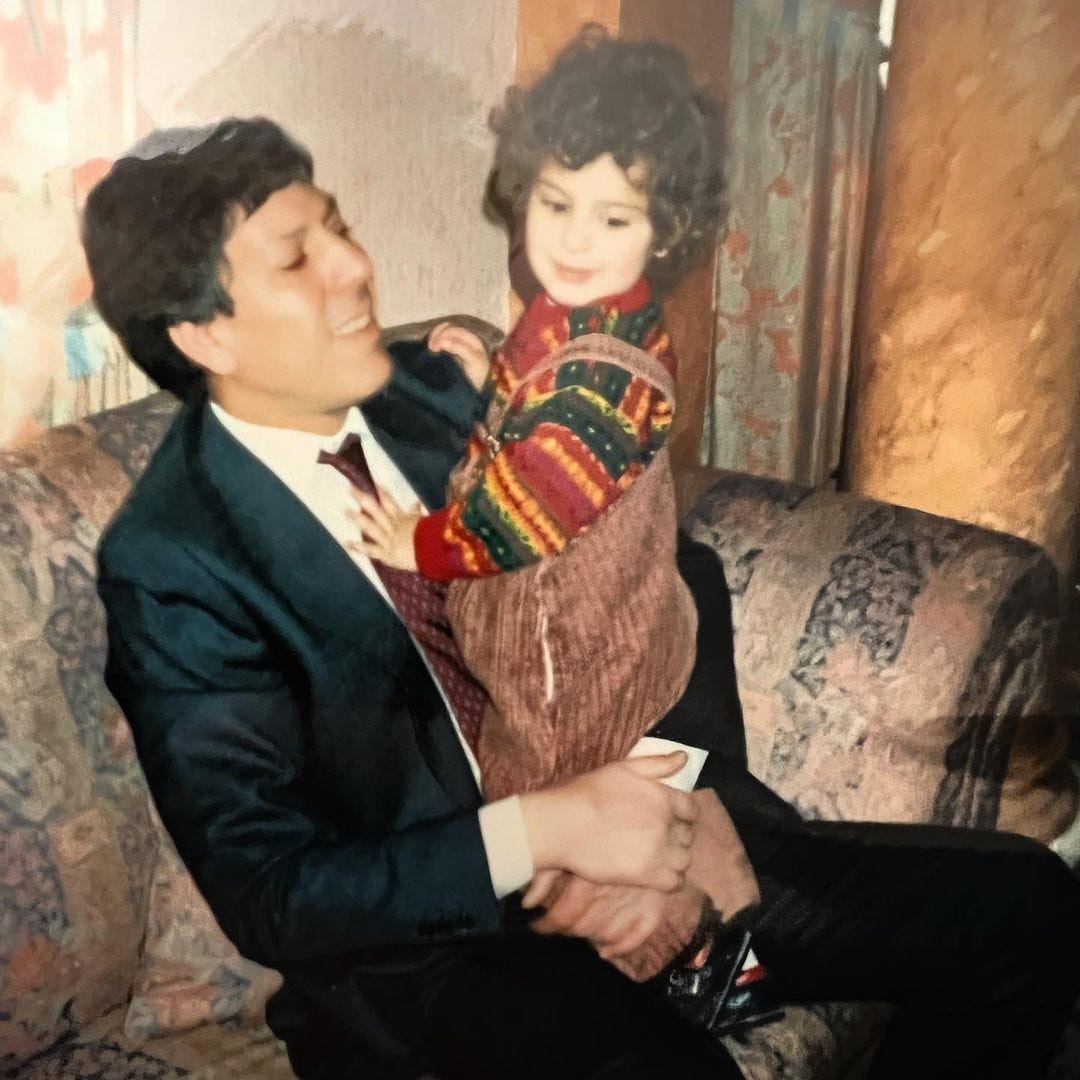Broadcasting: Richie Driss
Journalist, TV & Radio presenter Richie Driss talks about his four year tenure on Blue Peter, discovering his Algerian heritage as a teenager, and his experience with grief.
It’s Halloween, 2019. I’m dressed as a witch / spider / cat (confusing headgear paired with hastily drawn on whiskers and a cobweb strewn over my shoulders), standing in a sweaty TV studio, holding a heart rate monitor in one hand and a tarantula in the other. It’s Blue Peter, of course, and I am standing in for presenter Richie Driss, who - in about 38 minutes - will have to go live to the nation. I am the guinea pig in this experiment and I am obviously milking it. I really wanted to be a presenter and I thought - hey, guys, this could be my time to shine. Just you wait and see how amazing my reaction is going to be to this eight-legged monstrosity! In the end I was too scared to say anything other than ‘wow’, which I whispered about 11 times and too quietly for the microphones to pick up. Photographic evidence here.
I worked with Richie for about nine months. Our last day together comprised of a team bungee jump over Salford Quays to ‘test’ out the mechanism before he attempted it live for Sport Relief, March 2020. Yes, I did wonder if maybe I’d get talent-spotted as I hurled myself off a tiny ledge, terrified that my eyeballs were going to fall out. No luck, sadly. Still got my eyeballs though.
Fast forward four years, and here we are, sat in the BAFTA building on Piccadilly. No tarantulas or sickening heights to grapple with; only posh TV types drinking dirty martinis at 10am. Our conversation is enriching, and I am especially interested in exploring Richie’s unique experience of being mixed race but not always knowing it. We talk about what it was like to present the longest-running children’s TV show in the world whilst dealing with the loss of his father, flying to Algeria to meet a family he never knew existed, and his emotional connection to films. And, since we spoke, it’s been announced that Richie will be taking over Radio 1 Early Breakfast every Friday in April!
“It’s so much about perception. I fall into a category where everyone views me differently. I am ethnically ambiguous to almost everyone.”

You presented Blue Peter for four years, between 2019 and 2023. That’s a pretty iconic role to inhabit! Did you feel the pressure?
Definitely. You have a responsibility to make people feel a certain way and it feels like a huge pressure to deliver something that isn’t necessarily your voice or tone. But it was also an incredibly powerful position to be in. We continued to broadcast throughout the pandemic, covering the Black Lives Matter movement and explaining such crucially important situations and topics to the younger generation. It meant that kids had a safe space to go where they could listen, learn and share. This was before platforms like TikTok were operating in the way they do today, so it felt even more important that we utilised our role as presenters to talk about these issues.
Do you think the role of a presenter has changed over the last few years, given the huge influx of content creators, influencers, and - as you pointed out - TikTok?
For me, presenting and influencing are two separate things. I adore the work I do, but I’m not so big on the extraneous stuff. I don’t want to put my life online for everyone to see. But I do think the lines are becoming increasingly blurred. When I think back to what made me want to be a presenter, it was the idea of speaking to people I admire about their process. I was raised in a household of film, music and sport. I loved escaping into those worlds. I grew up watching The Lick with Trevor Nelson; the idea that one day I could do what he does was so exciting, especially because I’m genuinely bad at music and sport, so presenting felt like a hack to get me into those environments! Throughout my career, I’ve been lucky enough to interview actors like Denzel Washington, as well as writing, producing and presenting my own documentary, The Special 1, for BT Sport.
You said you were raised in a household of film. Talk to me more about what that looked like for you.
I grew up watching the classics. Clint Eastwood, a lot of Westerns, 60s films. I remember the first film I watched in the cinema was Alice in Wonderland and we had to leave because I was fucking terrified of the Cheshire Cat! Watching films was a real bonding experience for me from a young age. My parents split up when I was five or six, and I vividly remember that every time I’d go over to my dad’s house we would watch a film. I actually remember the last film I went to watch at the cinema with my dad was Sin City. Having that shared experience of watching something and talking about it afterwards was a big deal to me. But no talking during the film! My other half hates me for this but even if we’re watching a series at home, I don’t want to speak. I want to escape as much as possible.
It’s common for people of mixed heritage to feel like they don’t fit in, particularly when they’re younger. Did you have that experience?
I think about this a lot, because I genuinely don’t feel like I did have that experience until I was much older. That’s largely because I had no idea I was of mixed heritage until then. I grew up in a very white area and I was raised by my mum’s side of the family, most of whom live on a farm in Worcestershire, so I feel like I had a very white, English upbringing. It was only when I was in secondary school and someone mistook me for one of my best mates who was of Indian descent that I had this nagging feeling that there was something I didn’t know.
I started asking my parents questions, but I felt so stupid doing so at the age of 13 or 14, because I feel like it’s the sort of thing you should know as a child. But because my parents weren’t together, I’m not sure my mum felt like it was her place to talk about it. It wasn’t until I found my dad’s passport when I was about 16 that I learnt that he was Algerian. Whenever I’d asked him those questions in the past, he had said he was French. It makes me sad because I realise that, amongst racism, politics and a myriad of complex reasons, he lied because it’s so much more palatable in the UK to be French than it is to be Algerian. It’s so much about perception. I fall into a category where everyone views me differently. I am ethnically ambiguous to almost everyone.
As we speak, you’re preparing to go to Algeria for the first time. Is that a trip you’ve always wanted to go on?
My dad passed away in August 2022 after being ill for a really long time. During those final years, I had so many questions about myself and my Algerian heritage that were unanswered. But I didn’t want to push my dad to talk about things that were clearly difficult for him and risk ruining our relationship. I’ve always been a self-starter, so I decided to use Ancestry. Someone reached out to me on there and was like, ‘Our DNA is the most matched on here. Who are you? Were your parents from North Africa?’. I only saw that message a year later, in October 2023. It turns out she’s my third cousin. We kept in touch and arranged that I would go out there.
That must be an incredibly strange experience, knowing that you’re going to meet a side of your family that you don’t know and who don’t know you. How are you feeling?
People keep asking me that, understandably, but I really don’t know. I can’t contextualise it yet because it hasn’t happened.* I have found out more about myself in the last few months than I have in my 35 years on this planet, so it’s mad knowing that this trip will change who I am and the stories I’ve grown up believing. I’ve found out that my family were part of a tribe in Ouled Khaled. I have half brothers and sisters, three uncles and an auntie who I didn’t even know existed. It’s very weird. And it is scary. I don’t even know what I’m afraid of, maybe it’s the 35 years of waiting? I’m going during Ramadan as well. I'm not religious but I am going to fast. And I’m not good without my food!
*Since speaking to Richie, he has been on his journey to Algeria. You can follow him here to see how he got on.

I’m aware that we’ve spoken about some difficult experiences, so thank you so much for sharing those. I’d love to ask about the impact that working in the broadcasting industry has on your mental health?
I don’t make it a secret that I’ve been through my ups and downs. Losing my dad whilst presenting Blue Peter was really hard. I had so much going on. I was travelling back and forth from Manchester to Luton to look after my dad, and then presenting a live show every week. The mask definitely slipped a couple of times. There was a letter that a viewer sent in that broke my heart. They’d written, ‘Richie should try a little bit more’. I genuinely consider myself an actor during that time. I felt like if I could just play this role as a kid’s TV presenter then I’d be fine. It was good to have something to focus on, but it was tough because instead of using my experiences to inform my ‘character’, I was burying so much. On the one hand, it was a real blessing that I had that, but on the other it was really difficult.
Since learning more about your heritage, do you feel like there’s a responsibility or expectation of you to represent other North Africans within the industry?
It’s an interesting one because when I was on Blue Peter, kids or parents would often come up to me and say how amazing it was for them to see ‘someone like me’ on screen. I would always feel like an imposter because, whilst I am mixed race by blood, I don’t (or didn’t at the time) know anything about my Algerian heritage or culture. I don’t speak Arabic or French and I’m not Muslim. But, from the child’s perspective, if they feel visibly represented by me and therefore more seen or accepted, that’s all that matters.
Someone approached me whilst I was shopping in Milton Keynes (the glamour!) and said they followed me on Instagram and that they were also Algerian. I was so not expecting it that I was like, ‘Hi! Lovely to meet you! Bye!’. I kick myself every day that I didn’t make more of that conversation. I wish I’d asked them where they were from and connected on that level. I feel like I’m so ineloquent when it comes to talking about my heritage, but maybe that’s part of what makes this conversation we’re having so interesting!





